The best captivating complete perfect reads of selfless importance and relevance read as of April 2025
I started reading through books and comics from best-of lists I had missed. The need to compare and rank all gave form to this list of best of both fiction and non-fiction books and comics.
Tags:

I’ve been searching for what’s considered the best reads of all time. A lot of best-of reads are classics, obviously. I felt the need to form my own opinion about them, compare them to new praised reads (that rarely appears on these kinds of lists), and as an old sci-fi and comic fan give those a fighting chance as well.
My continuous updated ranked list is below, updated as I read more praised or randomly good reads. The title, above, defines the scope for this list, which is basically a description of what I think is my taste in literature. My criteria seems to be that the literary quality of a work is an important part, but perhaps secondary. The work has to tell something of more unintuitive importance for the current world or a plausible future, look beyond somewhat, through its story, themes or meanings. At the same time it has to captivate.
Untangling the scope
- Regarding “perfect”: stand alone books can maintain higher quality throughout and easier deliver all points top notch; a book series can vary more in quality; a better book tend to find the needed balance of it’s actors, settings, plots, themes and conflicts.
- Regarding “selfless”: I’m referring to books that matters more than the self; themes or meanings that matters for society, culture, humanity or the ‘world’.
- Regarding “relevance”: books should still bear great relevance in general, and preferably not have missed too much when envisioning the future — older classic sci-fi struggle with the latter — but sometimes it just works in another way.
The 5 best books and comics
The Road (Cormac McCarthy 2006)
:fill(white)/https://www.foliosociety.com/static/media/catalog/product/2/2/RCM_1_base.jpg)
A perfected warning of a truly desperate felt journey through a scorched world’s remains, still humans exploit. A barren, ashy world, the man and his son is slowly escaping with a wheel cart, scavenging what little they find, surviving inhuman climate and the deserted road and its few others exploitative, desperate. Through humanity’s hopelessness they carry the fire. The Road Folio edition cover, illustrated by Gérard DuBois
Moby Dick (Herman Melville 1851)
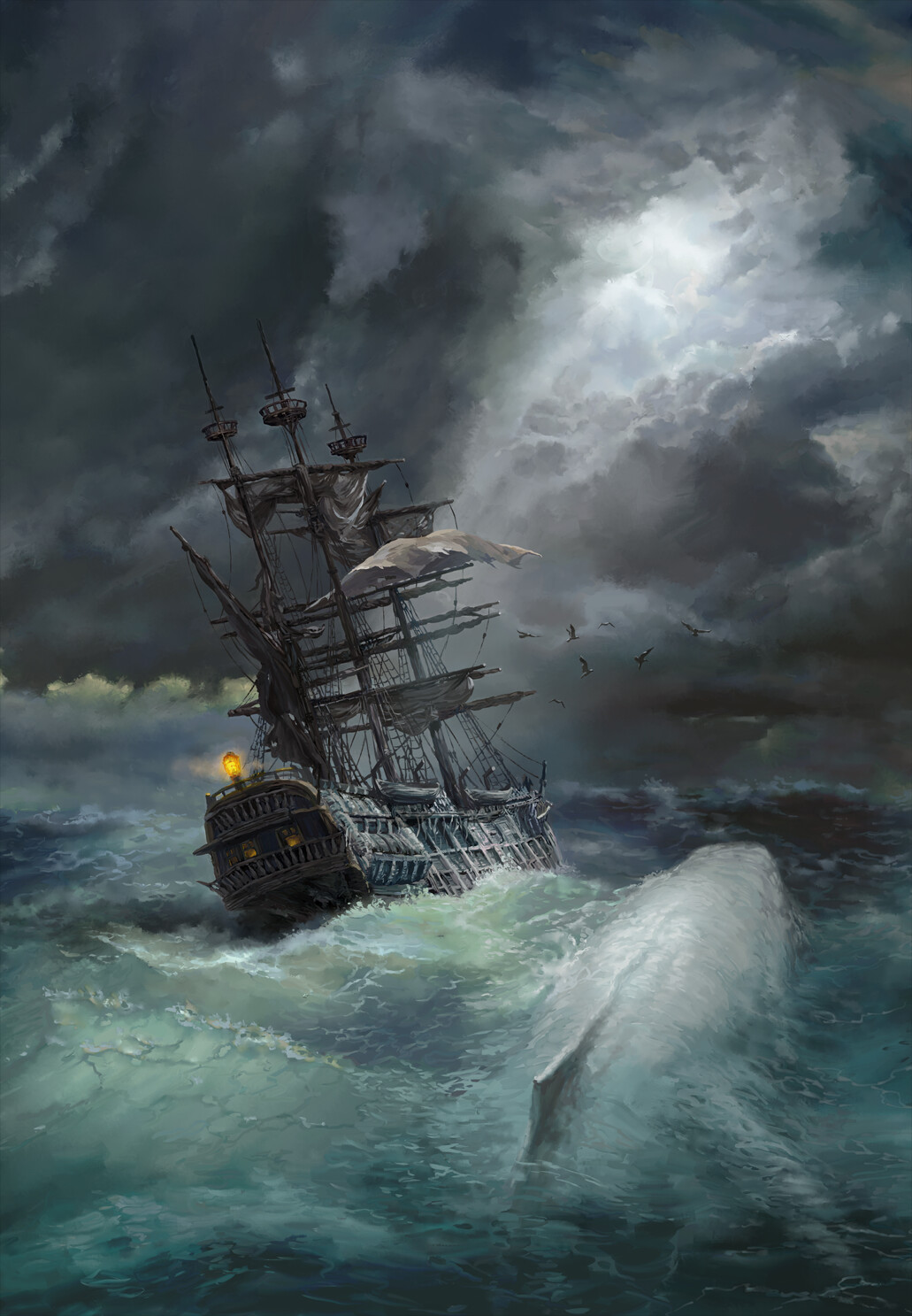
A marvelous, colorful but very blue adventure of greed in a time gone by, yet timeless. Charming – and less so – sailship whale-hunting romanticism of the then last human dangerous naive conquest of sea and the admired mightiest animal of an ecosystem for greed and Ahab’s unrightful vindictive hunt of the fierce Moby Dick. Moby Dick art by Sergey Shikin
Orbital (Samantha Harvey 2023)

Uniquely beautiful from the space station – space is also dark. Life aboard the space station affects body and mind. From its view, dip into all human and earthly aspects: beauty, to the darker; our effects on weather to the extreme; difference in capital, opportunities and living; private space ventures, and; an optimistic migration-image of earth’s missing planetary flag. Orbital Vintage edition cover by Aino-Maija Metsola, interviewed at creativeboom.com
Child of God (Cormac McCarthy 1973)
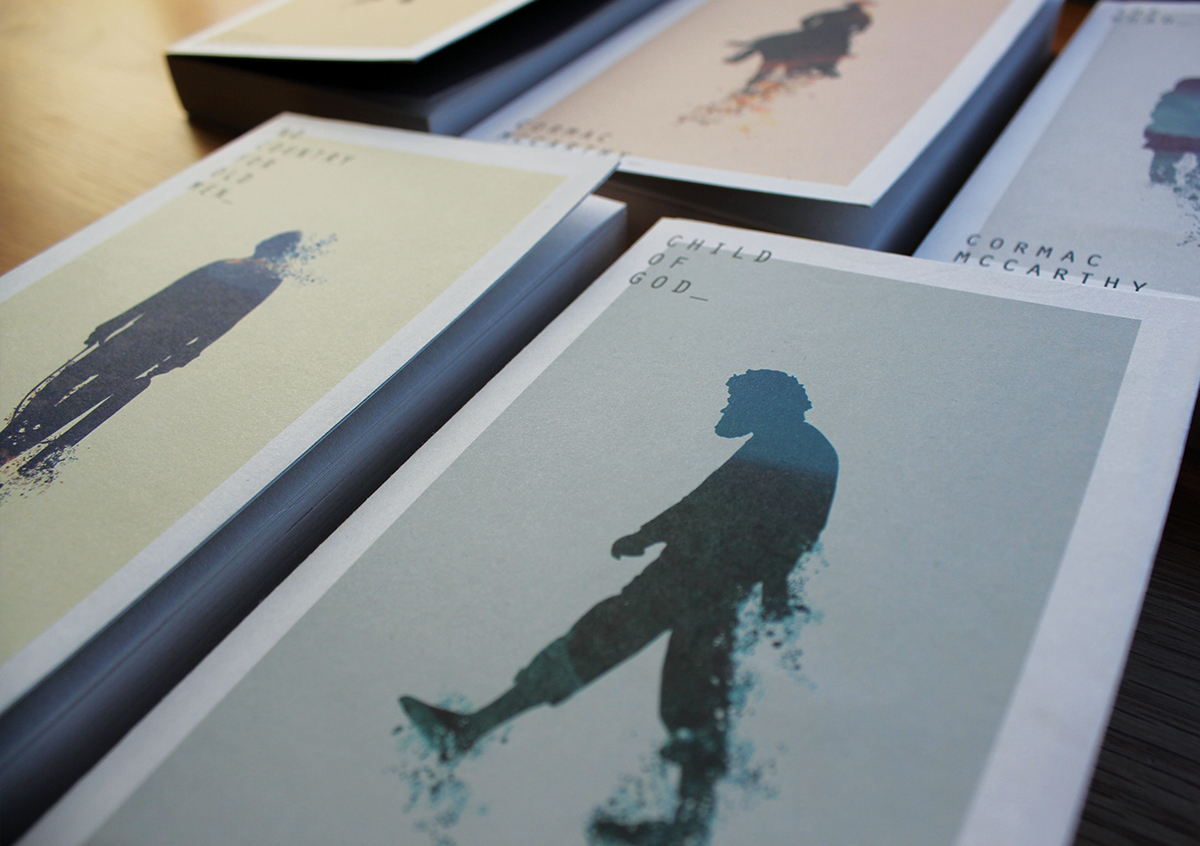
A perfectly balanced portrait of descriptive and non-descriptive of a disturbed outcast inflicting deranged actions on his rural society. Lester Ballard, a simple outcast of society, loosing his family land in a 1960s rural Tennessee, a less ideal childhood, lack of societal sympathy and getting accustomed to a poor, uncivilized, lonely living and he’s affected, and he disturbingly roams above and below ground of his surrounding area till that which no longer is his society must take action. Child of God cover art by Ian Westwater (behance.net)
Minor Detail (Adania Shibli 2017)
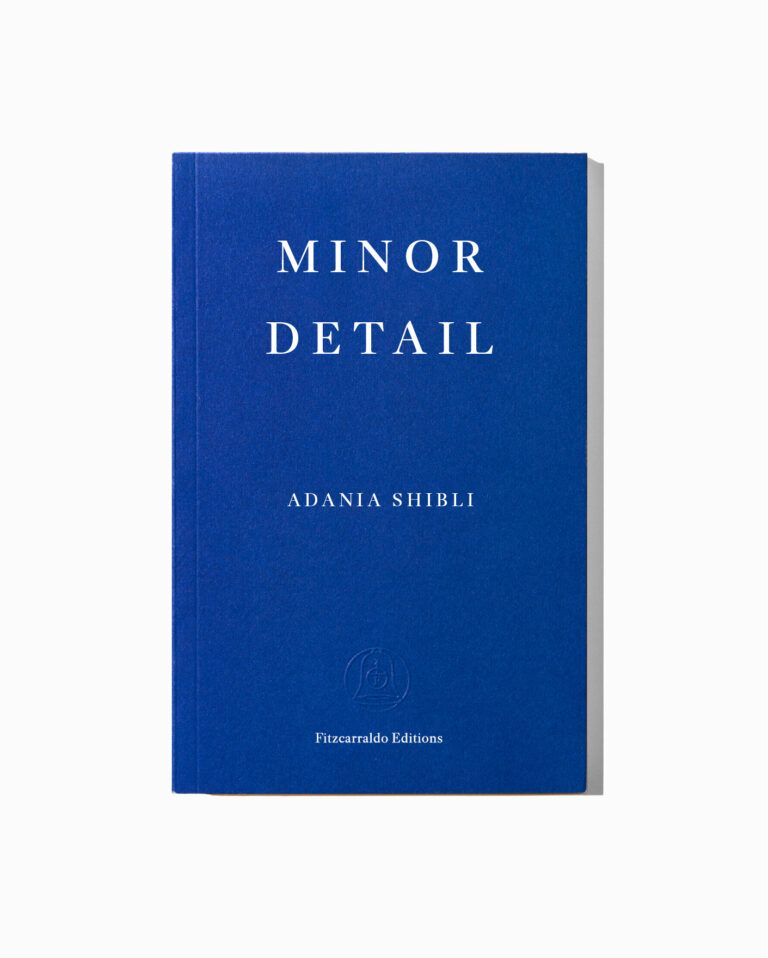
From a tense, detailed description of 5 days of an Israeli officer weeding out ‘infiltrators’ in the Negev desert in 1949, forward to the absurd, tragic living situation Israel over time has enforced the ‘infiltrators’ so effect-fully and uniquely voiced from the protagonist’s West Bank point of view about to embark on a road trip to Negev. The first half of the book describes an Israeli officer during August 9–13, 1949, his unit patrolling what he calls their land by right for whom they call infiltrators. A minor detail, as the protagonist of the second half of the book expresses it, takes place connecting a captured ‘infiltrator’ with the protagonist in the over 60 years later West Bank and her bizarre living situation in area A in between Israeli settlements and Israel’s military. Born exactly 25 years later she randomly reads about this minor detail. It sends her on a road trip to area D through the absurdity of Israel’s military control with a borrowed ID and car, seeking the minor detail.
Though the real life situation constantly evolves, Minor Detail feels like a timeless, sometimes humor-filled, tragic masterpiece of a real dystopia. Minor Detail Fitzcarraldo Editions cover
Honorable mentions
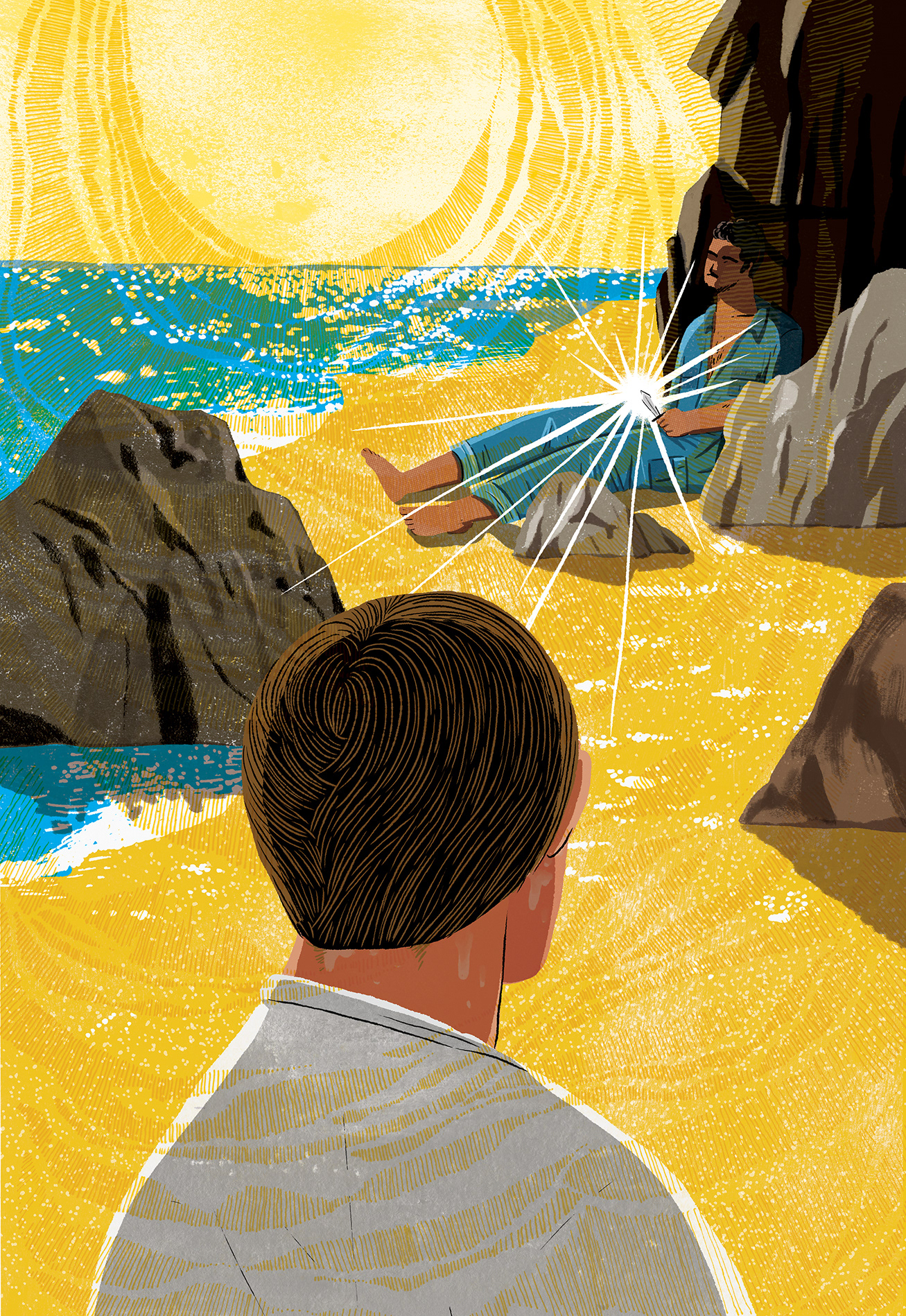
Mother died today. Or maybe yesterday, I don’t know.
The Outsider (Albert Camus 1942). A brilliantly simple but philosophically complex story of Meursault living in radical honesty when tangled up in absurd-feeling norms and bureaucracy as an outsider’s way of immediate living. Lacking in emotions and norms, Meursault is radically honest – that’s how he chooses to live. From his simple everyday routines, how his simple body-mind needs affects him and how his amoral interactions presents him a chain of events leading to crime, and he holds on to his way when caught up in the bureaucracy of justice. Meursault is simply brought along in life by how his way of living affects his surroundings, which becomes very real when society turns on him. The Outsider art by Yeji Yun (behance.net)

Into Thin Air: A Personal Account of the Mt. Everest Disaster (Jon Krakauer 1997). A season in the human attraction to and craziness of extremes, the case being Mount Everest. A pressure to expose those involved of more danger in a competitive business, histories of life changing death and survival stories, and the especially dangerous and high paying jobs that is tempting the poor locals to a high death toll. Into Thin Air cover art by Christian Grey Hawkins

No Country for Old Men (Cormac McCarthy 2005). A deadly no country for old men, the state of the modern world through the layered, violent chase of illegal money and old justice. No Country for Old Men Folio edition cover, illustrated by Gérard DuBois
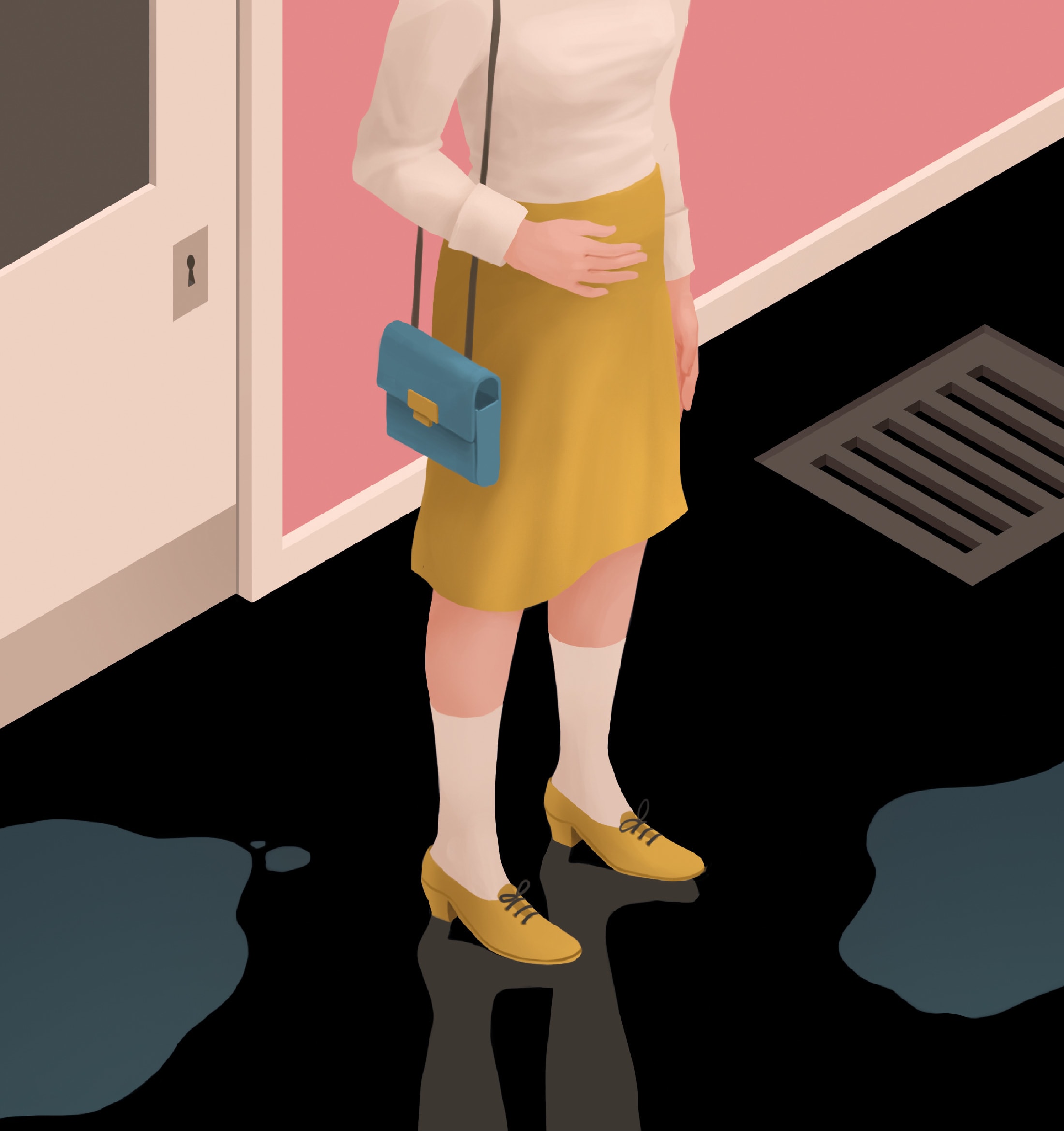
Happening (Annie Ernaux 1999). Sharp, to the point, author’s experience of illegal abortion that timelessly depicts the mixed morality that can be involved in occupations manifested when something societally necessary is illegalized. Happening cover art by Laura Wächter
- The Anomaly (Hervé Le Tellier 2020).
- Swimming With Sharks: My Journey into the World of the Bankers (Joris Luyendijk 2016).
- Shark Drunk: The Art of Catching a Large Shark from a Tiny Rubber Dinghy in a Big Ocean (Morten A. Strøksnes 2015).
- Sad Tiger (Neige Sinno 2023).
- Hyperion, The Fall of Hyperion (Dan Simmons 1989, 1990).
- Solaris (Stanislaw Lem 1961).
- We who are about to… (Joanna Russ 1976).
- A day in the life of Abed Salama (Nathan Thrall 2023).
- Blindsight (Peter Watts 2006).
- Watchmen (Moore & Gibbons 1986-1987).
- Shyness and Dignity (Dag Solstad 1994).
- Tarantula (Eduardo Halfon 2024).
- The Old Man and the Sea (Ernest Hemingway 1952).
- The Lord of the Rings (J. R. R. Tolkien 1954-1955).
- The Passenger (Cormac McCarthy 2022)
- Slaughterhouse-Five or The Children’s Crusade: A Duty-Dance with Death (Kurt Vonnegut 1969).
- Fire Upon the Deep (Vernor Vinge 1992).
- Blood Meridian or The Evening Redness in the West (Cormac McCarthy 1985).
- A Rumor of War (Philip Caputo 1977).
- The Dispossessed (Ursula K. Le Guin 1974).
- Hilda and the Troll (Luke Pearson 2010).
- Satantango (László Krasznahorkai 1985).
- Hunger (Knut Hamsun 1890).
- We (Yevgeny Zamyatin 1921).
B-tier – B for below
Crime and Punishment (Fyodor Dostoevsky 1866). A Shining (Jon Fosse 2023). The Years (Annie Ernaux 2008). Mengele Zoo (Gert Nygårdshaug 1989). My Struggle: Book 1 (Karl Ove Knausgård 2009). The Freeze-Frame Revolution (Peter Watts 2018). One Hundred Years of Solitude (García Márquez 1967). My brilliant friend (Elena Ferrante 2011). Lanzarote (Michel Houellebecq 2000). Morning and Evening (Jon Fosse 2000). Dune (Frank Herbert 1965). The Vegetarian (Han Kang 2007). Do Androids Dream of Electric Sheep? (Philip K. Dick 1968). Soft City (Pushwagner 1969-1975). Frankenstein; or, The Modern Prometheus (Mary Shelley 1818). 2001: A Space Odyssey (Arthur C. Clarke 1968). Remembrance of Earth’s Past (Cixin Liu 2006, 2008, 2010). Project Hail Mary (Andy Weir 2021). The Arrival (Shaun Tan 2006). Metabarons (Jodorowsky & Giménez 1992-2003). Neuromancer (William Gibson 1984). 1984 (George Orwell 1949). Brave New World (Aldous Huxley 1932). The Great Gatsby (F. Scott Fitzgerald 1925). Nausicaä of the Valley of the Wind (Miyazaki 1982-1994). Sapiens: A Brief History of Humankind (Yuval Noah Harari 2011). Dark Matter (Blake Crouch 2016). The Incal (Jodorowsky & Moebius 1980-1988). This Is How You Lose the Time War (Amal El-Mohtar & Max Gladstone 2019). Foundation (Isaac Asimov 1951).
Reflection
This little obsession started when I explored what sci-fi I ‘needed’ to read and looked at best-of lists of sci-fi. I’ve been reading many considered the best and those I thought possibly could make this list. Then I continued exploring what’s considered the best books of all time in the same way. And then comics, graphical novels and mangas. And, update in 2025, I’ve been continuing and keeping up to date with new reads.
Classics are naturally more easily widely regarded as best-ofs, perhaps they were unique when published, and over a longer time are mentioned as great books and becomes more read, and for people reading less modern they still appear as great books without being compared to modern great books with authors that possibly have built on all the preceding greats. Some aggregated best-of lists are too colored of other older lists and classics. But some classics, like Moby Dick!, really hold up though, then some seem flat to me, barely telling us anything today, like The Great Gatsby. A list for me is more likely to be an actual best-of list when I see a mix of old classics, modern classics and newer. And preferably the list presents the criteria/scope — what separates a great book from the best books on this list.
There were some surprises along the way for me, e.g., how Ernaux and Hemingway ended up in my top 20, read more by accident, and finding the, to me, unknown, Blindsight on top of a sci-fi list — I’ve later seen it on top of another list — and being that special read as it is. I’ve also noticed that my taste has changed somewhat during this project, or that just putting words on my taste have made me tone in more on what’s really for me.
For my top pick, The Road hasn’t been on top of any list, but it’s present on several both sci-fi and general best-of lists, but still a bit by chance I borrowed and read the best book ever written. A book I’m not sure I have the stomach to read again. Luckily there’s apparently many great books to continue this journey with.